By Kathleen Kennedy Townsend, on Wed Aug 24, 2011 at 8:30 AM ET 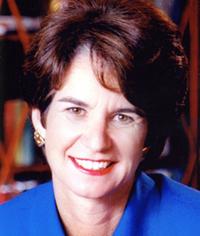 America is a religious nation. Polls may differ, but most find that over 80 percent of Americans say they believe in God. Fifty percent also say they go to church on Sunday, while only half of those actually do. I guess this shows that we want to look better than we actually are, at least to the public — if not to God, who presumably knows what we’re really up to. America is a religious nation. Polls may differ, but most find that over 80 percent of Americans say they believe in God. Fifty percent also say they go to church on Sunday, while only half of those actually do. I guess this shows that we want to look better than we actually are, at least to the public — if not to God, who presumably knows what we’re really up to.
Most political candidates also profess their belief in God. At the same time, they rarely make a big deal of their devotion. They’ve probably read Matthew 6:1, which warns, “Beware of practicing your piety before men in order to be seen by them.”
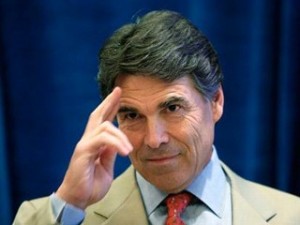 Texas Gov. Rick Perry, who just announced he’s running for president, has taken a different tack. A week before announcing his candidacy, he led a prayer meeting for evangelical Christians in Houston. The Freedom From Religion Foundation filed a lawsuit trying to stop him from participating in this rally, arguing that he was violating the First Amendment by using his position, stationery, and website to promote the event. The court dismissed the complaint, saying that the plaintiff didn’t show sufficient harm to merit the injunction. Texas Gov. Rick Perry, who just announced he’s running for president, has taken a different tack. A week before announcing his candidacy, he led a prayer meeting for evangelical Christians in Houston. The Freedom From Religion Foundation filed a lawsuit trying to stop him from participating in this rally, arguing that he was violating the First Amendment by using his position, stationery, and website to promote the event. The court dismissed the complaint, saying that the plaintiff didn’t show sufficient harm to merit the injunction.
I disagree with the court’s ruling. I think the governor misused his office to promote a particular religion. That might have been clearer to the judge if Perry had organized a rally in support of Islam rather than Christianity. There’s no difference as far as the First Amendment is concerned.
Read the rest of…
Kathleen Kennedy Townsend: Is Rick Perry as Christian as He Says He Is?
By Kathleen Kennedy Townsend, on Wed Aug 3, 2011 at 8:30 AM ET  The headline in the passenger’s Washington Post Express newspaper two seats in front of me on the Metro caught my eye: “Home Births Up 20%.” Wow, I thought, that’s impressive. The headline in the passenger’s Washington Post Express newspaper two seats in front of me on the Metro caught my eye: “Home Births Up 20%.” Wow, I thought, that’s impressive.
Inevitably, the headline brought back memories of my children’s births. Three of our four daughters were born at home, and the fourth would have been, but I went into labor while visiting my mother in McLean, Virginia. Instead of rushing back to Baltimore, I hustled across the Potomac to the Bethesda Birthing Center, where Kerry Sophia was born.
Since the turn of the last twentieth century, the trend has been toward hospital births, and now less than 1 percent of all births are at home. Still, that 20 percent increase reported by the Centers for Disease Control is stunning.
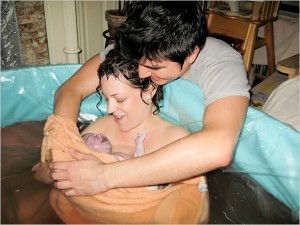 Expense may have something to do with the uptick. One woman quoted in the Associated Press article that ran in the Express said that her home birth cost $3,300 as opposed to over $10,000 in a hospital. Expense may have something to do with the uptick. One woman quoted in the Associated Press article that ran in the Express said that her home birth cost $3,300 as opposed to over $10,000 in a hospital.
But the trend toward home births is not just about cost. It’s about the kind of experience one wants. That’s why my husband, David, and I chose to have our children at home. The decision took a lot of thought and consideration.
When I was pregnant for the first time, I’d never considered a home birth. My mother had given birth 11 times, each time in a hospital. Without knowing the alternatives, I imagined that was where I would have my own children.
Read the rest of…
Kathleen Kennedy Townsend: Giving Birth at Home-A Good Idea?
By Kathleen Kennedy Townsend, on Tue Jul 26, 2011 at 8:30 AM ET  In an earlier piece, I talked about the breakdown of our infrastructure based on my experience with the Washington DC Metro: the broken escalators, the slow Orange line, the unscheduled stops in the middle of tunnels. In an earlier piece, I talked about the breakdown of our infrastructure based on my experience with the Washington DC Metro: the broken escalators, the slow Orange line, the unscheduled stops in the middle of tunnels.
Today I’d like to add my complaints about the Maryland Area Regional Commuter line, MARC, where delays are not uncommon, and Amtrak’s Acela, which sustained a speed of 0 mph for two straight hours in New York’s Penn Station during one of my recent trips.
I choose the quiet car, because I don’t want to hear the curses that greet one delay after another. But then I think, Is passivity really the American way? Aren’t we supposed to take action, do something, get the job done? Americans solve problems. What’s going on when I read that China is launching a new line of fast trains and we aren’t even able to get our slow trains going?
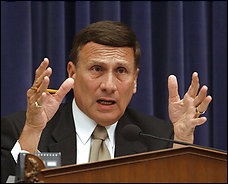 Congressman John Mica So I took it personally when Congressman John Mica, a Florida Republican and head of the House Transportation and Infrastructure Committee — rather than embracing the idea of an infrastructure bank that had the backing of John Kerry (Democrat) and Kay Bailey Hutchinson (Republican), the Chamber of Commerce, and the AFL-CIO — proposed to decrease infrastructure funding even beyond what Paul Ryan had proposed. Mica wants a 40 percent cut, to outdo the Tea Party’s cut of 30 percent.
The Republicans say they want to create jobs. But making it difficult to get to work is not the right path. And it’s tough get a job when you can’t get to an interview on time. On the delayed Acela, one of my fellow passengers complained (despite being in the quiet car) that he was going to miss his meeting with a potential client. As we sat in the station, unmoving, he became increasingly agitated and depressed. “In this bad economy, I really can’t afford not to meet him,” he said.
Read the rest of…
Kathleen Kennedy Townsend: Why Are Our Bridges Made in China?
By Kathleen Kennedy Townsend, on Tue Jul 19, 2011 at 8:30 AM ET  A few weeks ago, I was reading Walt Whitman, enthralled by the energy and rhythm of his poetry. It’s easy to see why he was embroiled in fights with 19th-century censors. “I will go to the bank by the wood and become undisguised and naked,” he wrote, “I am mad for it to be in contact with me.” In Song of Myself, he praises “a well-made man,” saying, “dress does not hide him;/The strong, sweet, supple quality he has strikes through the cotton and flannel;/To see him pass conveys as much as the best poem, perhaps more;/You linger to see his back, and the back of his neck and shoulder-side.” A few weeks ago, I was reading Walt Whitman, enthralled by the energy and rhythm of his poetry. It’s easy to see why he was embroiled in fights with 19th-century censors. “I will go to the bank by the wood and become undisguised and naked,” he wrote, “I am mad for it to be in contact with me.” In Song of Myself, he praises “a well-made man,” saying, “dress does not hide him;/The strong, sweet, supple quality he has strikes through the cotton and flannel;/To see him pass conveys as much as the best poem, perhaps more;/You linger to see his back, and the back of his neck and shoulder-side.”
And these are some of the milder passages. These probably aren’t the ones that got him fired from his job at the Department of the Interior and charged with “that horrible sin not to be mentioned among Christians.”
What’s most shocking about his writing today is not that he loves men or describes “the body electric.” What’s stunning is his democratic sensibility.
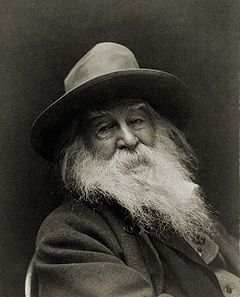 What a long way we’ve come. Whitman, who lived in Brooklyn for 28 years, would be astounded that New York has actually legalized same-sex marriage. He would have been equally amazed by a recent article in the New York Times about an effort to recruit more gays and lesbians into politics. And I’m sure his eyes would have widened a few weeks ago when the Federal Reserve Bank of Richmond ran a rainbow flag up its flagpole at the request of a group of gay and lesbian employees in honor of gay pride month. What a long way we’ve come. Whitman, who lived in Brooklyn for 28 years, would be astounded that New York has actually legalized same-sex marriage. He would have been equally amazed by a recent article in the New York Times about an effort to recruit more gays and lesbians into politics. And I’m sure his eyes would have widened a few weeks ago when the Federal Reserve Bank of Richmond ran a rainbow flag up its flagpole at the request of a group of gay and lesbian employees in honor of gay pride month.
These events–especially the New York decision–are victories in the fight for gay and lesbian equality. New York has joined a handful of other states where people who love each other can make a legal commitment in a public ceremony and announce to the world at large: We are men and women with hopes and dreams. The promise of freedom, equality, and happiness in the Declaration of Independence applies to us, just as it applies to you.
Read the rest of…
Kathleen Kennedy Townsend: Walt Whitman and the Soul of Democracy
By Kathleen Kennedy Townsend, on Tue Jul 12, 2011 at 12:00 PM ET  When I saw this terrific cartoon by Tom Toles in the Washington Post (see below) a couple of weeks ago, it struck a raw nerve, not just because I live with the second worst traffic jams in the country but also because the “Ask not” quote has been fresh in my mind. When I saw this terrific cartoon by Tom Toles in the Washington Post (see below) a couple of weeks ago, it struck a raw nerve, not just because I live with the second worst traffic jams in the country but also because the “Ask not” quote has been fresh in my mind.
Last January was the 50th anniversary of my uncle John Kennedy’s inauguration and the swearing in of my father as attorney general. I had known it would be an emotional week, full of pride in what they had accomplished and sadness at the terrible loss. I went to events at the Capitol and the Kennedy Center, and I also was asked to represent my family with a talk at the Justice Department, where I had served. The week brought back the excitement of that time, the bold initiatives, the fights over civil rights, the launching of the Peace Corps.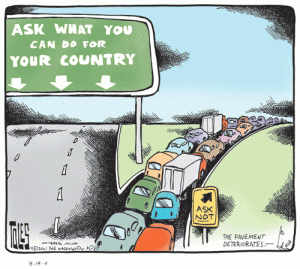
Despite the numerous citings of my uncle’s inaugural challenge, I almost never hear anything like that call to sacrifice for the good of our country from our leaders today.
The reality of the week turned even more difficult when my uncle Sargent Shriver died, as did my father’s long-time secretary, Angie Novello. The evening wake at Holy Trinity and the funeral were filled with great stories of Sarge’s enthusiasm and his determination to make the Peace Corps work. Angie, too, was honored for her steadiness and devotion.
I was filled with conflicting feelings as a slew of relatives, cousins, and their children continually met up at one memorial after another. I listened and laughed, but then I cried. The gaping holes in history and our hearts couldn’t be filled simply with memorials and great stories.
Months later, I can still feel the outpouring of affection for my family and a sense of the adventure of public service. Mostly, though, I’m puzzled by the disjunction between 1961 and now. Despite the numerous citings of my uncle’s inaugural challenge, I almost never hear anything like that call to sacrifice for the good of our country from our leaders today. Maybe they imagine that the only response would be the frantically jammed exit ramp in Tom Toles’ cartoon.
Read the rest of…
Kathleen Kennedy Townsend: Ask What You Can Do for Your Country? If Only!
By Kathleen Kennedy Townsend, on Tue Jul 5, 2011 at 8:30 AM ET  I recently attended an event for a group called Catholic Democrats in Indianapolis and then visited Thomas Merton’s monastery in Kentucky. In just a few days, I moved from the excitement of current politics to the more tranquil world of contemplation and theology. This inspiring week reminded me that Catholicism is not a narrow-minded religion but a universal church encompassing many ways to reach God. I recently attended an event for a group called Catholic Democrats in Indianapolis and then visited Thomas Merton’s monastery in Kentucky. In just a few days, I moved from the excitement of current politics to the more tranquil world of contemplation and theology. This inspiring week reminded me that Catholicism is not a narrow-minded religion but a universal church encompassing many ways to reach God.
The event I attended in Indianapolis was a joint fundraiser for Catholic Democrats and the Democratic candidate for mayor, Melina Kennedy (no relation). Now 16,000 strong, Catholic Democrats was founded by Patrick Whelan, a rheumatologist at Massachusetts General Hospital. Like me, he felt that Catholics who were focused on a single issue—abortion—were eroding the Church’s tradition of working for the common good.
For the past 20 years or so, it seemed that the Church hierarchy was in cahoots with the Republican party, insisting that good Catholics vote Republican. In 2004, some bishops came out and said it would be sinful to vote for John Kerry, given his pro-choice views. When I campaigned in Iowa during the 2008 presidential primaries, high school students told me that they felt they’d have to go to confession after voting for a pro-choice Democrat.
This inspiring week reminded me that Catholicism is not a narrow-minded religion but a universal church encompassing many ways to reach God.
Since then, a number of groups have begun to protest the hijacking of Catholic teachings by the conservative right. In May, when John Boehner gave the graduation address at Catholic University, more than 75 prominent Catholic academics sent him a letter that said, “From the apostles to the present, the Magisterium of the Church has insisted that those in power are morally obliged to preference the needs of the poor.” They added, “Your record in support of legislation to address the desperate needs of the poor is among the worst in Congress.”
Read the rest of…
Kathleen Kennedy Townsend: America’s Progressive Catholics
By Kathleen Kennedy Townsend, on Tue Jun 28, 2011 at 8:30 AM ET

Last week, I wrote about my father, Robert Kennedy, and his critique of Gross Domestic Product (GDP) as the measure of national well-being. He said, “It measures everything except that which makes life worthwhile. And it can tell us everything about America except why we are proud that we are Americans.”
Had my father lived, we might have started work a lot sooner on truer ways to measure the state of the nation. Sadly, that did not happen. His critique of the GDP was forgotten. Instead, other values came to govern American life.
In 1968, David Frost asked both Ronald Reagan and my father to speak on the purpose of life. Ronald Reagan answered:
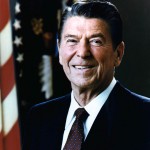 Well, of course, the biologist I suppose would say that like all breeds of animals, the basic instinct is to reproduce our kind, but I believe it’s inherent in the concept that created our country–and in the Judeo-Christian religion–that man is for individual fulfillment; for our religion is based on the idea not of any mass movement but of individual salvation. Each man must find his own salvation; I would think that our national purpose in this country–and we have lost sight of it too much in the last three decades–is to be free–to the limit possible with law and order, every man to be what God intended him to be. Well, of course, the biologist I suppose would say that like all breeds of animals, the basic instinct is to reproduce our kind, but I believe it’s inherent in the concept that created our country–and in the Judeo-Christian religion–that man is for individual fulfillment; for our religion is based on the idea not of any mass movement but of individual salvation. Each man must find his own salvation; I would think that our national purpose in this country–and we have lost sight of it too much in the last three decades–is to be free–to the limit possible with law and order, every man to be what God intended him to be.
My father said:
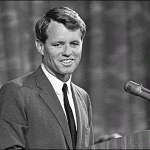 I think you have to break it down to people who have some advantages, and those who are just trying to survive and have their family survive. If you have enough to eat, for instance, I think basically it’s to make a contribution to those who are less well off. ‘I complained because I had no shoes until I met a man who had no feet.’ You can always find someone that has a more difficult time than you do, has suffered more, and has faced some more difficult time one way or the other. If you’ve made some contribution to someone else, to improve their life, and make their life a bit more livable, a little bit more happy, I think that’s what you should be doing. I think you have to break it down to people who have some advantages, and those who are just trying to survive and have their family survive. If you have enough to eat, for instance, I think basically it’s to make a contribution to those who are less well off. ‘I complained because I had no shoes until I met a man who had no feet.’ You can always find someone that has a more difficult time than you do, has suffered more, and has faced some more difficult time one way or the other. If you’ve made some contribution to someone else, to improve their life, and make their life a bit more livable, a little bit more happy, I think that’s what you should be doing.
Ronald Reagan’s views came to dominate the political landscape. Later, when he was asked what he meant by freedom, he described driving up the Pacific Coast Highway in a convertible with the wind blowing through his hair. Here was a man truly doing his own thing, alone.
George Washington and Thomas Jefferson had nice houses. They could have enjoyed contented private lives. But it was not just about their property.
What Ronald Reagan is remembered for does not reflect what he actually did. Of course, he believed in public engagement. He was a six-term president of the Screen Actors guild, calling union membership a “fundamental human right.” He was governor of California and president of the United States. He spoke eloquently about America as a “shining city on a hill.”
Read the rest of…
Kathleen Kennedy Townsend: The Pursuit of Happiness: What the Founders Meant—And Didn’t
By Kathleen Kennedy Townsend, on Mon Jun 20, 2011 at 12:00 PM ET  I recently spoke in Pesaro, Italy at a conference on new ways of measuring the well-being of nations and communities. For the past half-century, the yardstick for measuring national progress has traditionally been GDP. But in the last few years, a growing number of economists, concerned citizens, and even heads of state have been asking whether there is more to happiness than a big pile of dollar signs. I recently spoke in Pesaro, Italy at a conference on new ways of measuring the well-being of nations and communities. For the past half-century, the yardstick for measuring national progress has traditionally been GDP. But in the last few years, a growing number of economists, concerned citizens, and even heads of state have been asking whether there is more to happiness than a big pile of dollar signs.
Politicians, at times, see what should be done, but can’t quite persuade citizens to act–as when Franklin Roosevelt, despite the terrible threat Hitler presented, couldn’t convince Americans they should fight. Right now we’re on the cusp of taking seriously an insight about GDP that my father, Robert Kennedy, originally had more than 40 years ago.
For those who haven’t been reading speeches from 1968, let me remind you what my father said a few days after he announced his candidacy for the presidency. Speaking to students at the University of Kansas, he said:
 Click here to watch RFK's Eulogy for King, April 4, 1968 Too much and for too long, we seem to have surrendered personal excellence and community values in the mere accumulation of material things. Our gross national product, if we judge the United States of America by that, counts air pollution and cigarette advertising and ambulances to clear our highways of carnage. It counts special locks for our doors and the jails for people who break them. It counts the destruction of the redwood and the loss of our natural wonder in chaotic sprawl. It counts napalm and counts nuclear warheads and armored cars for police to fight the riots in our cities. It counts Whitman’s rifle and Speck’s knife and the television programs which glorify violence in order to sell toys to our children.
Yet the gross national product does not allow for the health of our children, the quality of their education, or the joy of their play. It does not include the beauty of our poetry or the strength of our marriages, the intelligence of our public debate or the integrity of our public officials. It measures neither our wit nor our courage; neither our wisdom nor our learning; neither our compassion nor our devotion to our country; it measures everything, in short, except that which makes life worthwhile. And it can tell us everything about America except why we are proud that we are Americans.
For years, my father’s words were viewed not as a practical challenge to the use of GDP but as an affirmation that a nation, like individuals, needs a purpose that is not merely material but spiritual. His policy insight didn’t catch on. With little dissent, we’ve continued to measure the success of a nation by a single number, its GDP.
Read the rest of…
Kathleen Kennedy Townsend: What Makes Life Worthwhile? GDP Won’t Tell You
By Kathleen Kennedy Townsend, on Tue Jun 14, 2011 at 12:00 PM ET  I’ve been mulling over a column by David Brooks on “The Politics of Solipsism” for the past couple of weeks. What he wrote is nervy to say the least. He argues that America has lost the republican virtues on which it was founded, namely, the curbing of self-centeredness in the interest of the public good. I too am a fan of Cicero, but Brooks fails in one of the primary republican virtues by not forthrightly acknowledging that Republicans, the adherents of Ayn Rand, are the ones who have most blatantly deserted these same virtues. Self interest has center stage on their platform. I’ve been mulling over a column by David Brooks on “The Politics of Solipsism” for the past couple of weeks. What he wrote is nervy to say the least. He argues that America has lost the republican virtues on which it was founded, namely, the curbing of self-centeredness in the interest of the public good. I too am a fan of Cicero, but Brooks fails in one of the primary republican virtues by not forthrightly acknowledging that Republicans, the adherents of Ayn Rand, are the ones who have most blatantly deserted these same virtues. Self interest has center stage on their platform.
Brooks praises Truman and Eisenhower, but he fails to mention that it was President Kennedy who repeatedly challenged Americans and asked them to sacrifice. He urged us to go to the moon because it was tough, not because it was easy. And when my father, Robert Kennedy, was running for president and medical students asked him who would pay for more health care for the poor, he quickly answered, “You will.”
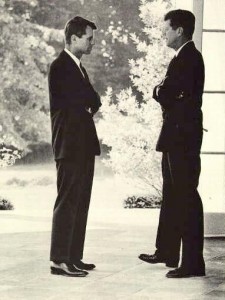 Contrary to the Republican philosophy, summed up by Ronald Reagan, that government is the problem, John and Robert Kennedy considered politics an honorable profession and affirmed that government was the place where we “make our most solemn common decisions.” Contrary to the Republican philosophy, summed up by Ronald Reagan, that government is the problem, John and Robert Kennedy considered politics an honorable profession and affirmed that government was the place where we “make our most solemn common decisions.”
Both my uncle and my father knew that America is at its best when its citizens are willing to give up something for others. That was the spirit in which they committed themselves to public service. Ultimately they both gave their lives in the service of their country.
Like my father and my uncle, I believe that serving the public good is the essential republican virtue. In fact I led the effort to make Maryland the first and still only state in the country where community service is a condition of high school graduation. I did this because I believe that virtue comes from habits developed, not sermons given. Aristotle said, “we become house builders by building houses, we become harp players by playing the harp, we grow to be just by doing just actions.”
Republican governors are making their mark attacking public servants. They’re laying off citizens who exemplify republican virtues like teaching in inner city schools, fighting drug cartels, and rushing into burning buildings. Why? So that those who make outrageous salaries can pay lower taxes.
Brooks says that Republicans want growth, but I see no evidence that they want growth for anyone but the most well off. Where is the commitment to education, to infrastructure, to science?
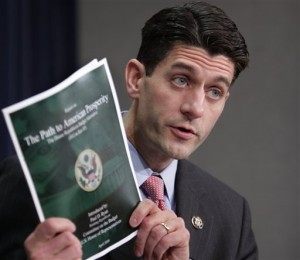 Rep. Paul Ryan Brooks commends Paul Ryan for sending the message that “politics can no longer be about satisfying voters’ immediate needs.” And yet Ryan would give the rich even more of a tax break at a time when our taxes are the lowest in three decades.
George Washington, whom Brooks also praises, would be surprised that the rich are being asked to shoulder less of a burden. He supported excise taxes that would fall disproportionately on the wealthy. When he went to war, he brought his wife, Martha, to share the hard, cold winter of Valley Forge along with him.
The wealthy have a special responsibility. From those who have been given much, much will be asked. In a true republic, people of wealth and privilege are first in line to serve in government, go to war, contribute to the honor and glory of their country. They set the nation’s values. If what they value is money, money, money, then the country will follow.
After 9/11, George Bush asked us to shop. At just the moment when he could have called us to a cause greater than ourselves, he (apparently on the advice of Karl Rove) urged us to step up for new TVs and designer bags rather than for the public good.
So if Brooks really wants to put an end to the politics of solipsism, he must take on the Republican party itself, which has done so little to cultivate the virtues of service, sacrifice, and commitment to country.
Please don’t lecture us about solipsism and republican virtues when it’s Republicans who are the ones who have made such a virtue of self interest.
Cross-posted from Atlantic.com
By Kathleen Kennedy Townsend, on Fri Jun 10, 2011 at 8:30 AM ET  I recently visited Madison where I spoke to Wisconsin Women in Government, a group founded 24 years ago to support women who choose a career in public service. I welcomed the chance to talk about the ways women discover their power, a subject near to my heart and experience. Even though I’d grown up in a very political family, I’d never imagined as a young girl that I’d become a lawyer or run for political office. That’s what guys did. But eventually the women’s movement empowered me to develop talents I didn’t know I had and inspired me to encourage other women to do the same. I recently visited Madison where I spoke to Wisconsin Women in Government, a group founded 24 years ago to support women who choose a career in public service. I welcomed the chance to talk about the ways women discover their power, a subject near to my heart and experience. Even though I’d grown up in a very political family, I’d never imagined as a young girl that I’d become a lawyer or run for political office. That’s what guys did. But eventually the women’s movement empowered me to develop talents I didn’t know I had and inspired me to encourage other women to do the same.
When I was in college, I saw women rally, conduct sit-ins and teach-ins, and march in the streets. In large groups and small meetings, women told their stories, demanded their rights, and passionately argued that they were equal to men. Women friends became class speakers, were hired to teach in law school, and won lawsuits. Heartened by their words and actions, I went to law school myself and founded a group called Women in Politics.
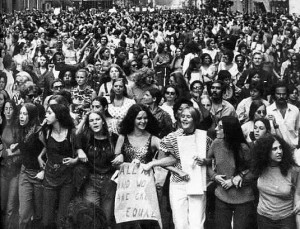 I couldn’t have accomplished these things without the support of other women who were also becoming empowered. Led by trailblazers like Betty Friedan and Gloria Steinem, we gradually came to see ourselves differently and stopped believing what the world kept telling us–that we didn’t have it in us to make it a man’s world. We changed ourselves and we changed society. Friendship and solidarity made these transformations possible. I couldn’t have accomplished these things without the support of other women who were also becoming empowered. Led by trailblazers like Betty Friedan and Gloria Steinem, we gradually came to see ourselves differently and stopped believing what the world kept telling us–that we didn’t have it in us to make it a man’s world. We changed ourselves and we changed society. Friendship and solidarity made these transformations possible.
It wasn’t easy. I didn’t have a single woman professor in college. After law school, I applied for a job at Legal Services, and since I had two children, asked if I could work part time. The director said no. He wanted Legal Services to stick to the same standards as large law firms. They didn’t have part-time lawyers, and neither would he. A few years later, he was elected to Congress and joined a family-friendly caucus. He had changed, like many others.
Read the rest of…
Kathleen Kennedy Townsend: Empowering Public Employees: Lessons From the Women’s Movement
|
|
 America is a religious nation. Polls may differ, but most find that over 80 percent of Americans say they believe in God. Fifty percent also say they go to church on Sunday, while only half of those actually do. I guess this shows that we want to look better than we actually are, at least to the public — if not to God, who presumably knows what we’re really up to.
America is a religious nation. Polls may differ, but most find that over 80 percent of Americans say they believe in God. Fifty percent also say they go to church on Sunday, while only half of those actually do. I guess this shows that we want to look better than we actually are, at least to the public — if not to God, who presumably knows what we’re really up to. Texas Gov. Rick Perry, who just announced he’s running for president, has taken a different tack. A week before announcing his candidacy, he led a prayer meeting for evangelical Christians in Houston. The Freedom From Religion Foundation filed a lawsuit trying to stop him from participating in this rally, arguing that he was violating the First Amendment by using his position, stationery, and website to promote the event. The court dismissed the complaint, saying that the plaintiff didn’t show sufficient harm to merit the injunction.
Texas Gov. Rick Perry, who just announced he’s running for president, has taken a different tack. A week before announcing his candidacy, he led a prayer meeting for evangelical Christians in Houston. The Freedom From Religion Foundation filed a lawsuit trying to stop him from participating in this rally, arguing that he was violating the First Amendment by using his position, stationery, and website to promote the event. The court dismissed the complaint, saying that the plaintiff didn’t show sufficient harm to merit the injunction.














Follow Kathleen: